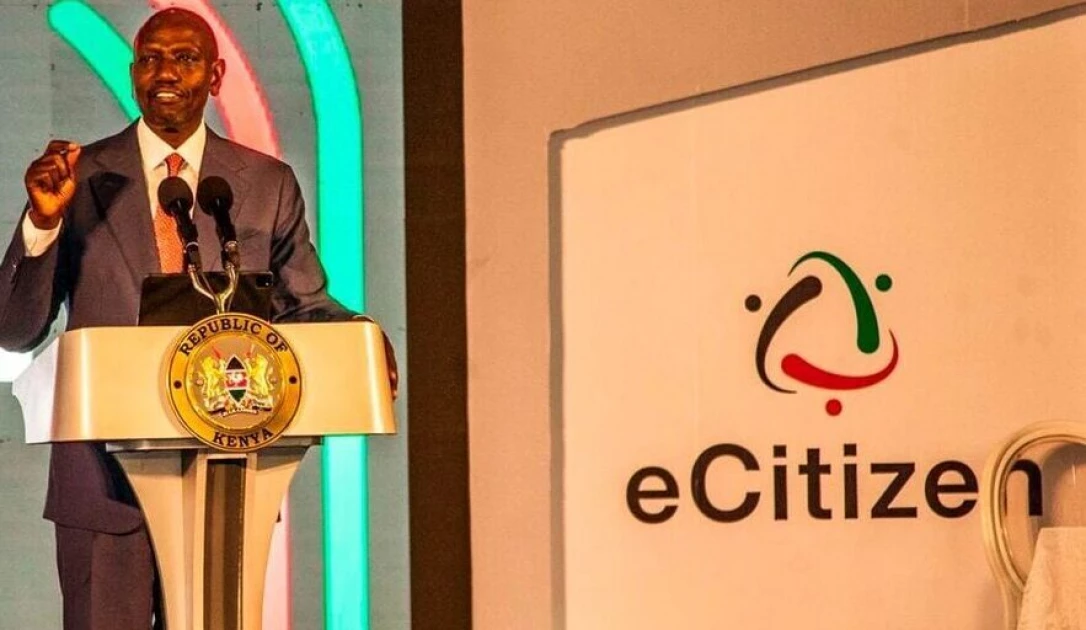Inside multimillion-shilling agreements, the private companies behind eCitizen

President William Ruto speaks during the eCitizen anniversary in 2024. Photo/FILE
Immigration and Citizen Services Principal
Secretary Belio Kipsang has come out to explain the contractual agreements
behind eCitizen, the government’s online portal for all state services.
Appearing before the National Assembly Administration
and Internal Security Committee at Parliament buildings in Nairobi on Tuesday, Kipsang
told MPs that the Immigration Department has contracted a developers' consortium
dubbed ECS (Electronic Services Solutions) LLC to maintain the platform.
The consortium comprises three firms: Webmasters
Kenya Limited, Pesaflow Limited and Olive Tree Media Limited.
Webmasters provides customer care and
related services, while Pesaflow handles all payments.
Olive Tree Media is, meanwhile, in charge
of bulk messaging and security support for notification services as well as
revenue mobilisation.
The government first introduced eCitizen in
2014. Since then, it has expanded to be the main gateway for over 5,000 county
and national government services by agencies like the National Transport and
Safety Authority, Kenya Revenue Authority, and the National Registration
Bureau.
However, Kipsang said the current contract
between his state department and the consortium took effect on May 25, 2023 and
runs for three years.
Per the agreement between the ICT
Authority and the consortium, which Citizen Digital saw, ECS has charged the
government Ksh.50 million for the ‘standardisation’ of the eCitizen system.
Additionally, its 'support and maintenance' costs
are billed annually between Ksh.300 million and Ksh.1.08 billion, depending on
the number of services on the platform.
The government also pays a 'payment gateway
tariff' billed between Ksh.10 and Ksh.20 per transaction, as well as service
onboarding charges.
These can go up to Ksh.1 million for ‘basic’ services, depending on the number; more services are cheaper, with over 3,000 services attracting a Ksh.400,000 tariff.
‘Intermediate’ services, meanwhile, attract
tariffs of between Ksh.3 million (0-50 services) and Ksh.1 million (above 3,000 services),
while for ‘complex’ ones, the government pays between Ksh.5 million and Ksh.2
million for the same brackets, respectively.
The consortium also charges ‘custom
services’ separately, with the government paying a daily fee of Ksh.52,500 for
a senior project manager or senior software developer.
A software tester, researcher and system
analyst is paid Ksh.27,000 daily.
Kipsang said eCitizen is continuously
monitored through the Security Operation Centre (SOC) at Nyayo House, Nairobi, “providing
real-time monitoring, intrusion detection, data integrity verification, and
regular penetration testing.”
“Our risk management policy proactively
identifies and assesses potential events or vulnerabilities, including
cyber-attacks, system failures, and operational risks, through regular risk
assessments,” the PS said.
Kipsang added that the Directorate of
eCitizen Services is responsible for the portal’s management and that all requisite
payments are transmitted directly to the National Treasury.
“We conduct Data Protection Impact
Assessments (DPIAs) in conjunction with the Office of the Data Protection
Commissioner (ODPC) to identify privacy risks and ensure our data processing
practices meet the highest protection standards,” he told MPs.
The platform in June 2023 suffered a major cyberattack,
which affected services for over a week, but then-ICT Cabinet Secretary Eliud
Owalo said no data was lost to the hackers.
Want to send us a story? SMS to 25170 or WhatsApp 0743570000 or Submit on Citizen Digital or email wananchi@royalmedia.co.ke
Comments
No comments yet.



Leave a Comment